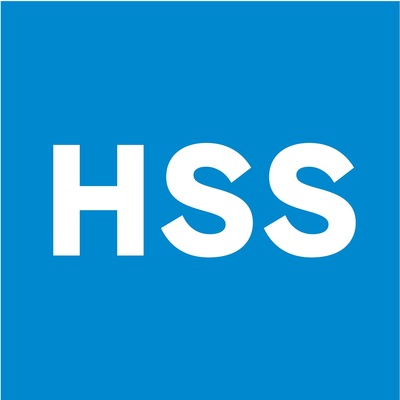SAN DIEGO, Sept. 3, 2021 /PRNewswire/ — Today, at the American Academy of Orthopaedic Surgeons (AAOS) 2021 annual meeting, Hospital for Special Surgery (HSS) sports medicine surgeon David M. Dines, MD, participated in an instructional case lecture on practical solutions in shoulder arthroplasty for patients with substantial shoulder socket bone loss known as glenoid bone deficiency. The interactive session provided attendees with an engaging opportunity to learn about the latest imaging and diagnostic methods, presurgical planning tools and arthroscopic techniques and implants, including patient-specific, convertible implants.
The glenoid is the socket part of the shoulder joint that connects to the ball of the upper arm bone. Glenoid bone loss can occur due to severe arthritis, traumatic injury or repetitive overuse in sports like baseball or swimming. It can also occur as a result of failed previous surgery. Symptoms associated with glenoid bone loss include inflammation, pain and decreased shoulder function.
“Shoulder arthroplasty to address glenoid deficiency is a very hot topic right now as we’re seeing more patients with arthritis and younger patients with complex anatomical issues,” said Dr. Dines. “Up to 10 or 15 years ago, we didn’t have much to offer. Today, we have advanced surgical techniques and a range of implant options for restoring mobility and improving patients’ quality of life.”
During the session, eight cases of varying levels of glenoid bone deficiency were presented for consideration by session attendees divided into groups at discussion tables. Members of an international panel of leading shoulder surgeons from the United States, France and Italy guided discussions at each table as participants formulated potential surgical approaches for each case. After groups shared their proposed approaches in a round-robin format, it was presented how HSS treated the cases. Attendees then had an opportunity to discuss and critique the solutions.
Session participants learned about the latest innovations for addressing glenoid bone loss, starting with advanced diagnostic imaging and pre-op planning systems used at HSS, one of the institutions with this capability.
Surgical approaches presented included two bone grafting techniques: bony increased offset-total shoulder arthroplasty (BIO-TSA) and bony increased offset-reverse shoulder arthroplasty (BIO-RSA). The latter reverses the ball and socket components of the joint for increased stability. Another case illustrated an augmented glenoid implant, which uses a metal or polyethylene wedge or a larger metal plate to replace bone loss. HSS has been at the forefront of developing augmented glenoid implants, Dr. Dines said.
Three complex cases of significant bone loss highlighted the use of patient-specific implants, the latest innovation in the field pioneered at HSS by Dr. Dines and colleagues. Known as the glenoid vault reconstruction system (VRS), it is used for patients with significant loss of bone and supporting joint structure. “We create a customized implant for each patient, based on 2D and 3D CT scans,” he explained. “The VRS works well to address severe bone loss in patients with advanced rheumatoid arthritis, after tumor removal or for revisions.” Dr. Dines said he looks forward to presenting results on treating about 75 HSS patients with the VRS at next year’s AAOS annual meeting.
“It’s an exciting time for advances in shoulder arthroplasty,” he concluded. “Our interactive session sparked many fruitful discussions that I hope will lead to increased shared learning and the development of more innovations for improving patient outcomes.”
About HSS
HSS is the world’s leading academic medical center focused on musculoskeletal health. At its core is Hospital for Special Surgery, nationally ranked No. 1 in orthopedics (for the 12th consecutive year), No. 4 in rheumatology by U.S. News & World Report (2021-2022), and the best pediatric orthopedic hospital in NY, NJ and CT by U.S. News & World Report “Best Children’s Hospitals” list (2021-2022). HSS is ranked world #1 in orthopedics by Newsweek (2020-2021). Founded in 1863, the Hospital has the lowest complication and readmission rates in the nation for orthopedics, and among the lowest infection rates. HSS was the first in New York State to receive Magnet Recognition for Excellence in Nursing Service from the American Nurses Credentialing Center five consecutive times. The global standard total knee replacement was developed at HSS in 1969. An affiliate of Weill Cornell Medical College, HSS has a main campus in New York City and facilities in New Jersey, Connecticut and in the Long Island and Westchester County regions of New York State, as well as in Florida. In addition to patient care, HSS leads the field in research, innovation and education. The HSS Research Institute comprises 20 laboratories and 300 staff members focused on leading the advancement of musculoskeletal health through prevention of degeneration, tissue repair and tissue regeneration. The HSS Global Innovation Institute was formed in 2016 to realize the potential of new drugs, therapeutics and devices. The HSS Education Institute is a trusted leader in advancing musculoskeletal knowledge and research for physicians, nurses, allied health professionals, academic trainees, and consumers in more than 130 countries. The institution is collaborating with medical centers and other organizations to advance the quality and value of musculoskeletal care and to make world-class HSS care more widely accessible nationally and internationally. www.hss.edu.
![]() View original content to download multimedia:https://www.prnewswire.com/news-releases/hss-interactive-case-lecture-highlights-practical-solutions-in-shoulder-arthroplasty-for-substantial-glenoid-bone-loss-301368983.html
View original content to download multimedia:https://www.prnewswire.com/news-releases/hss-interactive-case-lecture-highlights-practical-solutions-in-shoulder-arthroplasty-for-substantial-glenoid-bone-loss-301368983.html
SOURCE Hospital for Special Surgery
This post was originally published on https://stocksnewsfeed.com/benzinga/hss-interactive-case-lecture-highlights-practical-solutions-in-shoulder-arthroplasty-for-substantial-glenoid-bone-loss/









